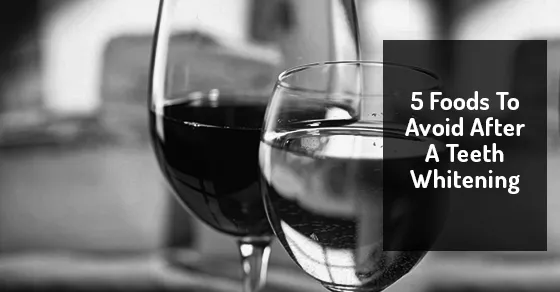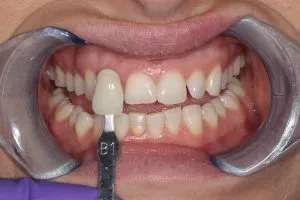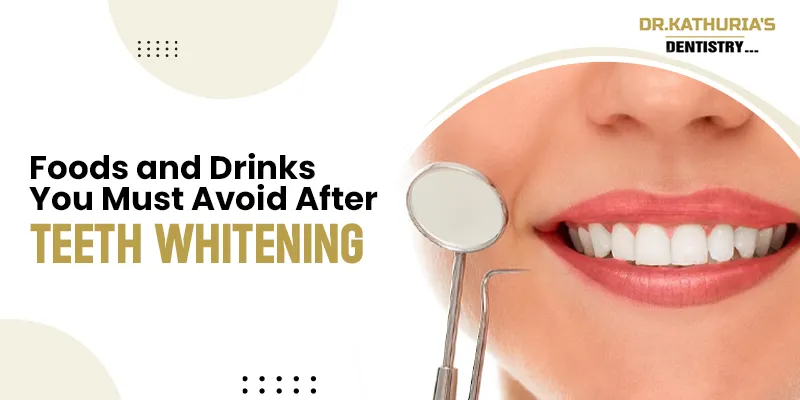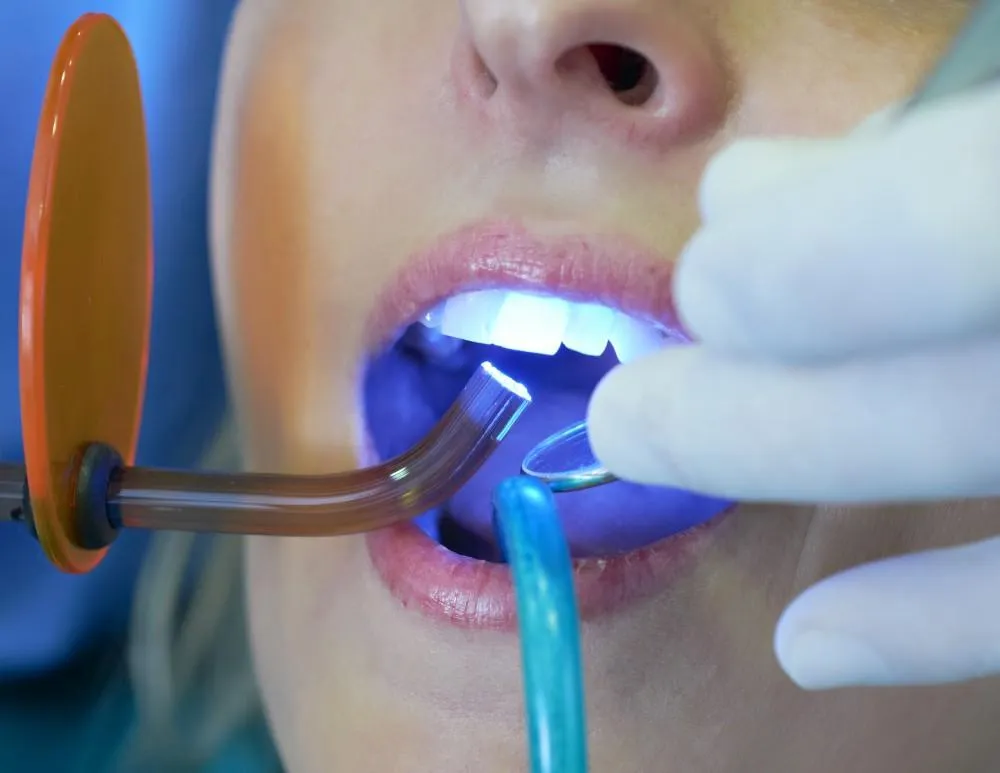Foods to Avoid After Teeth Whitening
Achieving a brighter, whiter smile through teeth whitening is a fantastic way to boost your confidence and improve your overall appearance. However, the success of your teeth whitening treatment isn’t solely dependent on the procedure itself. What you eat and drink in the days and weeks following the treatment plays a crucial role in maintaining your dazzling results. Certain foods and beverages can stain your newly whitened teeth, undoing the effects of the whitening process. Therefore, knowing which foods to avoid is essential for preserving your radiant smile and maximizing the longevity of your investment. This guide will provide you with valuable insights into the foods that can compromise your teeth whitening results and offer alternative choices to keep your smile looking its best.
Why Avoiding Certain Foods Is Crucial
After teeth whitening, the enamel of your teeth becomes temporarily more porous. This means that your teeth are more susceptible to staining from the pigments in the food and drinks you consume. The whitening process opens up the pores in your enamel, making it easier for staining agents to penetrate and discolor your teeth. While your enamel will re-mineralize and become less porous over time, it is critical to be vigilant about your diet in the initial days and weeks following the treatment. Avoiding staining foods during this vulnerable period can help you maintain the brilliance of your newly whitened teeth, ensuring that your smile remains bright and beautiful for longer. This proactive approach is a key aspect of successful teeth whitening aftercare.
Highly Pigmented Foods

One of the primary categories of foods to avoid after teeth whitening involves those with intense pigmentation. These foods contain strong coloring agents that can easily stain the porous surface of your teeth. The darker the food, the higher the risk of staining. Berries, for instance, such as blueberries, blackberries, raspberries, and even strawberries, are known for their vibrant colors and staining potential. Sauces and condiments with rich hues, like soy sauce, balsamic vinegar, and curry, should also be avoided. Additionally, deeply colored fruits like cherries and pomegranates can significantly impact your teeth’s whiteness. While these foods are generally healthy, they can quickly reverse the effects of teeth whitening, so it’s essential to be mindful of your consumption in the days following your treatment. Consider incorporating these foods back into your diet gradually once your teeth have become less susceptible to staining.
Coffee and Tea The Usual Suspects
Coffee and tea are notorious for staining teeth, and this is particularly true after a teeth whitening procedure. Both beverages contain tannins, which are compounds that cause the color molecules to bind to the enamel of your teeth. The dark pigments in coffee and tea can easily penetrate the pores of your teeth, leading to discoloration. This staining effect is amplified immediately after whitening because the enamel is more porous. Opting for clear beverages, such as water or clear soda, or waiting a few weeks before resuming your regular coffee or tea consumption can make a significant difference in maintaining your newly whitened smile. If you find it difficult to give up your daily coffee or tea, try drinking through a straw to minimize contact with your teeth. If you must consume them, be sure to brush your teeth immediately afterward.
Red Wine A Staining Culprit
Red wine, with its deep red color, is another significant culprit when it comes to staining teeth. The combination of tannins, acids, and pigments found in red wine can readily adhere to the enamel surface, causing noticeable discoloration. This effect is even more pronounced after teeth whitening, as the porous enamel absorbs these staining agents more readily. Even a single glass of red wine can potentially undo some of the whitening effects. During the initial post-whitening period, it is advisable to abstain from red wine entirely to protect the brightness of your smile. If you are craving an alcoholic beverage, consider a clear alternative like vodka with a clear mixer or a white wine, but even these carry some risk.
Dark-Colored Sodas and Juices

Dark-colored sodas and juices also pose a threat to your newly whitened teeth. These beverages often contain artificial colors and high concentrations of sugar, which can contribute to both staining and dental issues. Colas, dark fruit juices (such as grape or cranberry), and even some sports drinks have the potential to stain your teeth significantly. The acidity in these drinks can also erode the enamel, making your teeth even more vulnerable to staining. Choosing clear, sugar-free alternatives or drinking these beverages through a straw can help minimize contact with your teeth. Water is always the best option.
Tomato-Based Sauces
Tomato-based sauces, commonly found in pasta sauces, pizzas, and many other dishes, can also cause staining. The vibrant red color of tomatoes, along with their acidity, can contribute to discoloration of your teeth. The acids in tomato sauce can also erode the enamel, making it easier for stains to set in. Limiting your intake of tomato-based foods, especially in the days following teeth whitening, can help you maintain a brighter smile. Consider opting for alternative sauces or dishes that are less likely to stain, such as white sauces or those with clear ingredients.
Foods with Artificial Colors
Foods that contain artificial colors can also contribute to staining. Many processed foods, candies, and desserts are loaded with artificial dyes to enhance their appearance. These colorants can readily stain the porous enamel of your teeth. Be especially cautious of brightly colored candies, popsicles, and other treats that are often consumed by children. Reading labels and avoiding products with artificial colors can help you protect the whiteness of your teeth. Choosing naturally colored foods or opting for products that use natural dyes can be a safer bet for maintaining your bright smile.
Foods That Can Help Maintain Whitening

While certain foods can diminish the effects of teeth whitening, others can actually help maintain your bright smile. Incorporating these foods into your diet can provide additional support in keeping your teeth white and healthy. By making mindful choices about the foods you eat, you can ensure that your teeth stay brighter for longer.
Dairy Products
Dairy products, such as milk, yogurt, and cheese, are beneficial for your oral health. They are rich in calcium, which helps strengthen your tooth enamel and protects against staining. The calcium and phosphates in dairy products also help remineralize teeth, reducing the risk of cavities and preserving the whiteness achieved through whitening. Including dairy in your diet can be a natural way to maintain your bright, white smile.
White Meats and Fish
White meats and fish are great choices for maintaining a bright smile. They generally contain fewer pigments compared to red meats and can be a safe and healthy protein source after teeth whitening. Chicken, turkey, and many types of fish are unlikely to stain your teeth and are thus ideal for maintaining your white smile. Make sure to prepare these foods in ways that are not likely to cause staining. Grilled, baked, or steamed options are generally safe, whereas those prepared with heavily pigmented sauces may cause discoloration.
The Importance of Oral Hygiene

Regardless of the foods you consume, maintaining excellent oral hygiene is essential for preserving your teeth whitening results. Brushing your teeth at least twice a day with a whitening toothpaste, flossing daily, and using mouthwash can help remove surface stains and prevent new ones from forming. Regularly scheduled dental check-ups and professional cleanings will also help you keep your teeth bright and healthy. Following these steps will significantly enhance the longevity of your teeth whitening treatment and ensure that your smile remains as dazzling as possible.
In conclusion, maintaining a bright, white smile after teeth whitening involves more than just the procedure itself. Being mindful of the foods and beverages you consume, along with practicing good oral hygiene, is crucial for preserving your results. By avoiding staining foods, such as those with high pigmentation, and incorporating teeth-friendly alternatives, you can enjoy your radiant smile for much longer. Prioritizing your oral health and making informed dietary choices will undoubtedly help you maintain a confident, beautiful smile.
